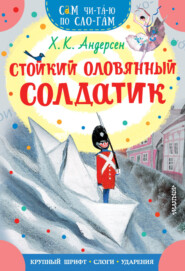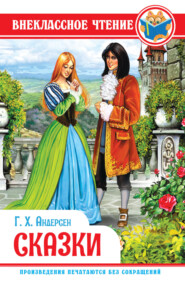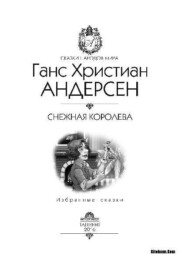По всем вопросам обращайтесь на: info@litportal.ru
(©) 2003-2024.
✖
O. T., A Danish Romance
Настройки чтения
Размер шрифта
Высота строк
Поля
It was a very lively evening. Late in the night the party broke up. The friends went to their chamber.
“My dear, faithful Otto!” said Wilhelm, and laid his hand on his shoulder; “you were very lively and good-humored this evening. Continue always thus!”
“I hope to do so,” answered Otto: “may we only always have as happy an evening as this!”
“Extraordinary man!” said Wilhelm, and shook his head. “Now we will soon set out on our journey, and catch for ourselves the happiness of the glorious gold bird!”
“And not let it escape again!” exclaimed Otto. “Formerly I used to say, To-morrow! to-morrow! now I say, To-day, and all day long! Away with fancies and complainings. I now comprehend that which you once said to me, that is. Man can be happy if he only will be so.”
Wilhelm took his hand, and looked into his face with a half-melancholy expression.
“Are you sentimental?” inquired Otto.
“I only affect that which I am not!” answered Wilhelm; and with that, suddenly throwing off the natural gravity of the moment, returned to his customary gayety.
The following days were spent in visiting and in receiving visitors. On every post-day Otto sought through the leathern bag of the postman, but he found no letter from German Heinrich, and heard nothing from him. “I have been deceived,” said he, “and I feel myself glad about it! She, the horrible one, is not my sister!”
There was a necessity for him to go away, far from home, and yet he felt no longing after the mountains of Switzerland or the luxuriant beauty of the south.
“Nature will only weaken me! I will not seek after it. Man it is that I require: these egotistical, false beings—these lords of everything! How we flatter our weaknesses and admire our virtues! Whatever serves to advance our own wishes we find to be excellent. To those who love us, we give our love in return. At the bottom, whom do I love except myself? Wilhelm? My friendship for him is built upon the foundation,—I cannot do without thee! Friendship is to me a necessity. Was I not once convinced that I adored Sophie, and that I never could bear it if she were lost to me? and yet there needed the conviction ‘She loves thee not,’ and my strong feeling was dead. Sophie even seems to me less beautiful; I see faults where I formerly could only discover amiabilities! Now, she is to me almost wholly a stranger. As I am, so are all. Who is there that feels right lovingly, right faithfully for me, without his own interest leading him to do so? Rosalie? My old, honest Rosalie? I grew up before her eyes like a plant which she loved. I am dear to her as it! When her canary-bird one morning lay dead in its cage, she wept bitterly and long; she should never more hear it sing, she should never more look after its cage and its food. It was the loss of it which made her weep. She missed that which had been interesting to her. I also interested her. Interest is the name for that which the world calls love. Louise?” He almost spoke the name aloud, and his thoughts dwelt, from a strong combination of circumstances, upon it. “She appears to me true, and capable of making sacrifices! but is not she also very different from all the others? How often have I not heard Sophie laugh at her for it—look down upon her!” And Otto’s better feeling sought in vain for a shadow of self-love in Louise, a single selfish motive for her noble conduct.
“Away from Denmark! to new people! Happy he who can always be on the wing, making new friendships, and speedily breaking them off! At the first meeting people wear their intellectual Sunday apparel; every point of light is brought forth; but soon and the festival-day is over, and the bright points have vanished.”
“We will set off next week!” said Wilhelm, “and then it shall be—
‘Over the rushing blue waters away!
We will speed along shores that are verdant and gay!’
Away over the moors, up the Rhine, through the land of champagne to the city of cities, the life-animating Paris!”
CHAPTER XLII
“A maiden stood musing, gentle and mild. I grasped the hand of the friendly child, but the lovely fawn shyly disappeared.... From the Rhine to the Danish Belt, beautiful and lovely maidens are found in palaces and tents; yet nobody pleases me.”—SCHMIDT VON LÜBECK.
The last day at home was Sophie’s birthday. In the afternoon the whole family was invited to the Kammerjunker’s, where Jakoba and the Mamsell were to be quite brilliant in their cookery.
A table filled with presents, all from the Kammerjunker, awaited Miss Sophie; it was the first time that he had ever presented to her a birthday gift, and he had now, either out of his own head or somebody’s else, fallen on the very good idea of making her a present for every year which she had lived. Every present was suited to the age for which it was intended, and thus he began with a paper of sugar-plums and ended with silk and magnificent fur; but between beginning and end there were things, of which more than the half could be called solid: gold ear-rings, a boa, French gloves, and a riding-horse. This last, of course, could not stand upon the table. It was a joy and a happiness; people walked about, and separated themselves by degrees into groups.
The only one who was not there was Eva. She always preferred remaining at home; and yet, perhaps, to-day she might have allowed herself to have been overpersuaded, had she not found herself so extremely weak.
Silently and alone she now sat at home in the great empty parlor. It was in the twilight; she had laid down her work, and her beautiful, thoughtful eyes looked straight before her: thoughts which we may not unveil were agitating her breast.
Suddenly the door opened, and Wilhelm stood before her. Whilst the others were walking he had stolen away. He knew that Eva was alone at home; nobody would know that he visited her, nobody would dream of their conversation.
“You here!” exclaimed Eva, when she saw him.
“I was compelled to come,” answered he. “I have slipped away from the others; no one knows that I am here. I must speak with you, Eva. To-morrow I set off; but I cannot leave home calmly and happily without knowing—what this moment must decide.”
Eva rose, her checks crimsoned, she cast down her eyes.
“Baron Wilhelm!” stammered she, “it is not proper that I should remain here!” She was about to leave the room.
“Eva!” said Wilhelm, and seized her hand, “you know that I love you! My feelings are honorable! Say Yes, and it shall be holy to me as an oath. Then I shall begin my journey glad at heart, as one should do. Your assent shall stand in my breast, shall sound in my ear, whenever sin and temptation assail me! It will preserve me in an upright course, it will bring me back good and unspoiled. My wife must you be! You have soul, and with it nobility! Eva! in God’s name, do not make a feeble, life-weary, disheartened being of me!”
“O Heavens!” exclaimed she, and burst into tears, “I cannot, and—will not! You forget that I am only a poor girl, who am indebted for everything to your mother! My assent would displease her, and some time or other you would repent of it! I cannot!—I do not love you!” added she, in a tremulous voice.
Wilhelm stood speechless.
Eva suddenly rang the bell.
“What are you doing?” exclaimed he.
The servant entered.
“Bring in lights!” said she; “but first of all you must assist me with these flowers down into the garden. It will do them good to stand in the dew.”
The servant did as she bade; she herself carried down one of the pots, and left the room.
“I do not love you!” repeated Wilhelm to himself, and returned to the company which he had left, and where he found all gayety and happiness.
The supper-table was spread in the garden; lights burned in the open air with a steady flame; it was a summer-evening beautiful as the October of the South; the reseda sent forth its fragrance; and when Sophie’s health was drunk cannon were fired among the lofty fir-trees, the pines of the North.
The next morning those countenances were dejected which the evening before had been so gay. The carriage drew up to the door. The dear mother and sisters wept; they kissed Wilhelm, and extended their hands to Otto.
“Farewell!” said Louise; “do not forget us!” and her tearful glance rested upon Otto. Eva stood silent and pale.
“You will not forget me!” whispered Otto, as he seized Louise’s hand. “I will forget your sister!”
The carriage rolled away; Wilhelm threw himself back into a corner. Otto looked back once more; they all stood at the door, and waved their white handkerchiefs.
CHAPTER XLIII
“In one short speaking silence all conveys—
And looks a sigh, and weeps without a tear.”
MRS. BROWNING.
“Forgive us our debts as we
The debts of others forgive;
And lead us not in tempting ways;
Apart from evil let us live.”
A. VON CHAMISSO.
We will not accompany the friends, but will remain behind in Funen, where we will make a bolder journey than they, namely, we will go back one-and-twenty years. We will allow the circumstances of Otto’s birth again to come before us. It is a leap backward that we take from 1830 to 1810. We are in Odense, that old city, which takes its name from Odin.
The common people there have still a legend about the origin of the name of the city. Upon Naesbyhoved’s Hill[37 - Author’s Note: Not far from the city, by the Odense Channel; it is described in Wedel Simonsen’s City Ruins.] there once stood a castle; here lived King Odin and his wife: Odense city was not then in existence, but the first building of it was then begun.[38 - Author’s Note: The place is given as being that of the now so-called Cross Street.] The court was undecided as to the name which should be given to the city. After long indecision it was at last agreed that the first word which either King or Queen should speak the next morning should be the name given to it. In the early morning the Queen awoke and looked out from her window over the wood. The first house in the city was erected to the roof, and the builders had hung up a great garland, glittering with tinsel, upon the rooftree. “Odin, see!” exclaimed the Queen; and thenceforward the city was called Odensee, which name, since then, has been changed by daily speech to Odense.
When people ask the children in Copenhagen whence they have come, they reply, out of the Peblingsöe. The little children of Odense, who know nothing about the Peblingsöe, say that they are fetched out of Rosenbaek, a little brook which has only been ennobled within the few last years, just as in Copenhagen is the case with Krystal Street, which formerly had an unpleasant name. This brook runs through Odense, and must, in former times, when united with the Odense River, have formed an island where the city at that time stood; hence some people derive the name of Odense from Odins Ei, or Odins Ö, that is, Odin’s Island. Be it then as it might, the brook flows now, and in 1810, when the so-called Willow-dam, by the West Gate, was not filled up, it stood, especially in spring, low and watery. It often overflowed its banks, and in so doing overflowed the little gardens which lay on either side. It thus ran concealed through the city until near the North Gate, where it made its appearance for a moment and then dived again in the same street, and, like a little river, flowed through the cellars of the old justice-room, which was built by the renowned Oluf Bagger.[39 - Author’s Note: He was so rich that once, when Frederick the Second visited him, he had the room heated with cinnamon chips. Much may be found about this remarkable man in the second collection of Thiele’s Popular Danish Legends. His descendants still live in Odense, namely, the family of the printer Ch. Iversen, who has preserved many curiosities which belonged to him.]
“My dear, faithful Otto!” said Wilhelm, and laid his hand on his shoulder; “you were very lively and good-humored this evening. Continue always thus!”
“I hope to do so,” answered Otto: “may we only always have as happy an evening as this!”
“Extraordinary man!” said Wilhelm, and shook his head. “Now we will soon set out on our journey, and catch for ourselves the happiness of the glorious gold bird!”
“And not let it escape again!” exclaimed Otto. “Formerly I used to say, To-morrow! to-morrow! now I say, To-day, and all day long! Away with fancies and complainings. I now comprehend that which you once said to me, that is. Man can be happy if he only will be so.”
Wilhelm took his hand, and looked into his face with a half-melancholy expression.
“Are you sentimental?” inquired Otto.
“I only affect that which I am not!” answered Wilhelm; and with that, suddenly throwing off the natural gravity of the moment, returned to his customary gayety.
The following days were spent in visiting and in receiving visitors. On every post-day Otto sought through the leathern bag of the postman, but he found no letter from German Heinrich, and heard nothing from him. “I have been deceived,” said he, “and I feel myself glad about it! She, the horrible one, is not my sister!”
There was a necessity for him to go away, far from home, and yet he felt no longing after the mountains of Switzerland or the luxuriant beauty of the south.
“Nature will only weaken me! I will not seek after it. Man it is that I require: these egotistical, false beings—these lords of everything! How we flatter our weaknesses and admire our virtues! Whatever serves to advance our own wishes we find to be excellent. To those who love us, we give our love in return. At the bottom, whom do I love except myself? Wilhelm? My friendship for him is built upon the foundation,—I cannot do without thee! Friendship is to me a necessity. Was I not once convinced that I adored Sophie, and that I never could bear it if she were lost to me? and yet there needed the conviction ‘She loves thee not,’ and my strong feeling was dead. Sophie even seems to me less beautiful; I see faults where I formerly could only discover amiabilities! Now, she is to me almost wholly a stranger. As I am, so are all. Who is there that feels right lovingly, right faithfully for me, without his own interest leading him to do so? Rosalie? My old, honest Rosalie? I grew up before her eyes like a plant which she loved. I am dear to her as it! When her canary-bird one morning lay dead in its cage, she wept bitterly and long; she should never more hear it sing, she should never more look after its cage and its food. It was the loss of it which made her weep. She missed that which had been interesting to her. I also interested her. Interest is the name for that which the world calls love. Louise?” He almost spoke the name aloud, and his thoughts dwelt, from a strong combination of circumstances, upon it. “She appears to me true, and capable of making sacrifices! but is not she also very different from all the others? How often have I not heard Sophie laugh at her for it—look down upon her!” And Otto’s better feeling sought in vain for a shadow of self-love in Louise, a single selfish motive for her noble conduct.
“Away from Denmark! to new people! Happy he who can always be on the wing, making new friendships, and speedily breaking them off! At the first meeting people wear their intellectual Sunday apparel; every point of light is brought forth; but soon and the festival-day is over, and the bright points have vanished.”
“We will set off next week!” said Wilhelm, “and then it shall be—
‘Over the rushing blue waters away!
We will speed along shores that are verdant and gay!’
Away over the moors, up the Rhine, through the land of champagne to the city of cities, the life-animating Paris!”
CHAPTER XLII
“A maiden stood musing, gentle and mild. I grasped the hand of the friendly child, but the lovely fawn shyly disappeared.... From the Rhine to the Danish Belt, beautiful and lovely maidens are found in palaces and tents; yet nobody pleases me.”—SCHMIDT VON LÜBECK.
The last day at home was Sophie’s birthday. In the afternoon the whole family was invited to the Kammerjunker’s, where Jakoba and the Mamsell were to be quite brilliant in their cookery.
A table filled with presents, all from the Kammerjunker, awaited Miss Sophie; it was the first time that he had ever presented to her a birthday gift, and he had now, either out of his own head or somebody’s else, fallen on the very good idea of making her a present for every year which she had lived. Every present was suited to the age for which it was intended, and thus he began with a paper of sugar-plums and ended with silk and magnificent fur; but between beginning and end there were things, of which more than the half could be called solid: gold ear-rings, a boa, French gloves, and a riding-horse. This last, of course, could not stand upon the table. It was a joy and a happiness; people walked about, and separated themselves by degrees into groups.
The only one who was not there was Eva. She always preferred remaining at home; and yet, perhaps, to-day she might have allowed herself to have been overpersuaded, had she not found herself so extremely weak.
Silently and alone she now sat at home in the great empty parlor. It was in the twilight; she had laid down her work, and her beautiful, thoughtful eyes looked straight before her: thoughts which we may not unveil were agitating her breast.
Suddenly the door opened, and Wilhelm stood before her. Whilst the others were walking he had stolen away. He knew that Eva was alone at home; nobody would know that he visited her, nobody would dream of their conversation.
“You here!” exclaimed Eva, when she saw him.
“I was compelled to come,” answered he. “I have slipped away from the others; no one knows that I am here. I must speak with you, Eva. To-morrow I set off; but I cannot leave home calmly and happily without knowing—what this moment must decide.”
Eva rose, her checks crimsoned, she cast down her eyes.
“Baron Wilhelm!” stammered she, “it is not proper that I should remain here!” She was about to leave the room.
“Eva!” said Wilhelm, and seized her hand, “you know that I love you! My feelings are honorable! Say Yes, and it shall be holy to me as an oath. Then I shall begin my journey glad at heart, as one should do. Your assent shall stand in my breast, shall sound in my ear, whenever sin and temptation assail me! It will preserve me in an upright course, it will bring me back good and unspoiled. My wife must you be! You have soul, and with it nobility! Eva! in God’s name, do not make a feeble, life-weary, disheartened being of me!”
“O Heavens!” exclaimed she, and burst into tears, “I cannot, and—will not! You forget that I am only a poor girl, who am indebted for everything to your mother! My assent would displease her, and some time or other you would repent of it! I cannot!—I do not love you!” added she, in a tremulous voice.
Wilhelm stood speechless.
Eva suddenly rang the bell.
“What are you doing?” exclaimed he.
The servant entered.
“Bring in lights!” said she; “but first of all you must assist me with these flowers down into the garden. It will do them good to stand in the dew.”
The servant did as she bade; she herself carried down one of the pots, and left the room.
“I do not love you!” repeated Wilhelm to himself, and returned to the company which he had left, and where he found all gayety and happiness.
The supper-table was spread in the garden; lights burned in the open air with a steady flame; it was a summer-evening beautiful as the October of the South; the reseda sent forth its fragrance; and when Sophie’s health was drunk cannon were fired among the lofty fir-trees, the pines of the North.
The next morning those countenances were dejected which the evening before had been so gay. The carriage drew up to the door. The dear mother and sisters wept; they kissed Wilhelm, and extended their hands to Otto.
“Farewell!” said Louise; “do not forget us!” and her tearful glance rested upon Otto. Eva stood silent and pale.
“You will not forget me!” whispered Otto, as he seized Louise’s hand. “I will forget your sister!”
The carriage rolled away; Wilhelm threw himself back into a corner. Otto looked back once more; they all stood at the door, and waved their white handkerchiefs.
CHAPTER XLIII
“In one short speaking silence all conveys—
And looks a sigh, and weeps without a tear.”
MRS. BROWNING.
“Forgive us our debts as we
The debts of others forgive;
And lead us not in tempting ways;
Apart from evil let us live.”
A. VON CHAMISSO.
We will not accompany the friends, but will remain behind in Funen, where we will make a bolder journey than they, namely, we will go back one-and-twenty years. We will allow the circumstances of Otto’s birth again to come before us. It is a leap backward that we take from 1830 to 1810. We are in Odense, that old city, which takes its name from Odin.
The common people there have still a legend about the origin of the name of the city. Upon Naesbyhoved’s Hill[37 - Author’s Note: Not far from the city, by the Odense Channel; it is described in Wedel Simonsen’s City Ruins.] there once stood a castle; here lived King Odin and his wife: Odense city was not then in existence, but the first building of it was then begun.[38 - Author’s Note: The place is given as being that of the now so-called Cross Street.] The court was undecided as to the name which should be given to the city. After long indecision it was at last agreed that the first word which either King or Queen should speak the next morning should be the name given to it. In the early morning the Queen awoke and looked out from her window over the wood. The first house in the city was erected to the roof, and the builders had hung up a great garland, glittering with tinsel, upon the rooftree. “Odin, see!” exclaimed the Queen; and thenceforward the city was called Odensee, which name, since then, has been changed by daily speech to Odense.
When people ask the children in Copenhagen whence they have come, they reply, out of the Peblingsöe. The little children of Odense, who know nothing about the Peblingsöe, say that they are fetched out of Rosenbaek, a little brook which has only been ennobled within the few last years, just as in Copenhagen is the case with Krystal Street, which formerly had an unpleasant name. This brook runs through Odense, and must, in former times, when united with the Odense River, have formed an island where the city at that time stood; hence some people derive the name of Odense from Odins Ei, or Odins Ö, that is, Odin’s Island. Be it then as it might, the brook flows now, and in 1810, when the so-called Willow-dam, by the West Gate, was not filled up, it stood, especially in spring, low and watery. It often overflowed its banks, and in so doing overflowed the little gardens which lay on either side. It thus ran concealed through the city until near the North Gate, where it made its appearance for a moment and then dived again in the same street, and, like a little river, flowed through the cellars of the old justice-room, which was built by the renowned Oluf Bagger.[39 - Author’s Note: He was so rich that once, when Frederick the Second visited him, he had the room heated with cinnamon chips. Much may be found about this remarkable man in the second collection of Thiele’s Popular Danish Legends. His descendants still live in Odense, namely, the family of the printer Ch. Iversen, who has preserved many curiosities which belonged to him.]

















